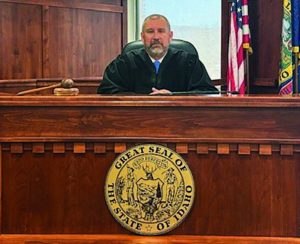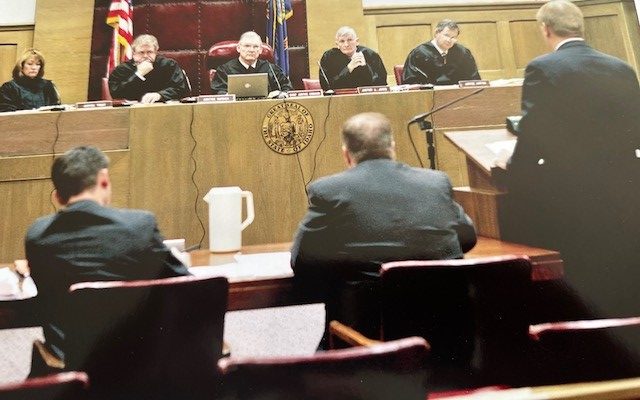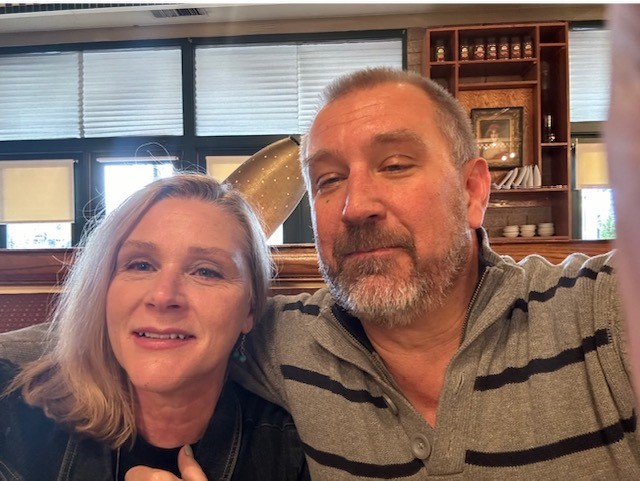Distinguished Jurist: Hon. Mitchell W. Brown

Background & Education
Judge Mitchell W. Brown, Mitch to most, has been a small-town kind of guy since the very beginning. He was born in Afton, Wyoming, about an hour and a half south of Jackson Hole. As a young child, his parents moved the family to Salt Lake City so his father could attend law school at the University of Utah; Judge Brown spent his elementary years in Salt Lake while his dad practiced law and his mom taught English at Lincoln Junior High School. In his seventh-grade year, his parents made the decision to move back to their hometown in Star Valley, Wyoming. Judge Brown continued his education, completing both junior high and high school in his hometown. He graduated from Star Valley High School in 1979.
Despite their move, Judge Brown’s father continued his law practice in the city and would commute every weekend to be home with the family while maintaining a residence in Salt Lake during the workweek. Judge Brown and his family spent the summers with their dad in Salt Lake. Judge Brown has fond memories of their midday basketball routine, where they’d go play basketball during lunch, then accompany his dad to court in the afternoons. He remembers, “I would sit around a lot of afternoons in the Third District Court, jumping from courtroom to courtroom.” Judge Brown’s interest in the legal profession began during these formative years.
While in high school, Judge Brown’s uncle on his father’s side, also a practicing attorney and sitting lower-court judge for several years, was appointed to sit on the Wyoming Supreme Court. Judge Brown had already been given the opportunity to observe his uncle preside in rural courtrooms across western Wyoming and his uncle’s appointment to the state Supreme Court gave Judge Brown a broader view of the profession that he would soon become quite fond of. Judge Brown recounts, “These two individuals, in their practices and professional lives, instilled in me the desire to be involved in the law. It was the trigger to get me to apply for and go to law school.”
Judge Brown attended the University of Wyoming in Laramie, Wyoming for two years. He took a short hiatus to serve a mission for the Church of Jesus Christ of Latter-Day Saints in Northern California and upon returning he attended the University of Utah for two semesters before finishing his undergraduate studies at Utah State University in Logan, Utah. He graduated with a B.S. in political science from Utah State University in 1997. While in Logan for his undergraduate studies, Judge Brown met and married his wife, Tricia. Shortly thereafter they relocated to Moscow, Idaho so Judge Brown could attend the University of Idaho College of Law. He graduated with his law degree in May 1990 and was admitted to the Idaho State Bar later that fall.
After graduation, Judge Brown accepted a job in Pocatello with Racine Olson (at the time called Racine, Olson, Nye, Cooper, Budge & Bailey). He worked a general practice at the start of his career, focusing on anything that would get him in the courtroom. He took a federal public defense contract, completed a lot of family law work, supported the work of the partners, and always kept his eye toward trial work. In the latter part of his tenure with the firm, he focused on insurance defense and civil litigation. This became his niche and where he’d end up focusing much of his practice prior to his appointment to the bench. Judge Brown worked as an associate for eight years, becoming partner in 1998 and continuing his work with the firm for another ten years.
In 2008 the opportunity came to apply for a judgeship when Judge Harding announced his retirement from the Sixth District bench. The jurisdiction held chambers in Caribou County and was just over the mountains from where Judge Brown grew up. Having always aspired to be a judge, this was a natural next step. Governor Otter appointed Judge Brown as Sixth District Judge, responsible for Caribou, Bear Lake, Franklin, and Bannock counties. He served as a sitting district judge from 2008 until September 2023, when he retired after 15 years of service to the profession. Judge Brown is currently acting as a Plan B Senior Judge since his retirement.

courtesy of Judge Brown.
Career Accomplishments & Notable Moments
During his time as a practicing attorney, Judge Brown took as many opportunities as he could to get into court, try cases, and hone his skills. In doing so, he completed a lot of pro bono work, and his firm was generous enough to allow him to do so. He received the Idaho State Bar’s Denise O’Donnell Day Pro Bono Award in 2002 and states, “That is an award I have always been proud of. I continue to try to give back to the community through pro bono work.” Judge Brown also served in all leadership capacities for the Sixth District Bar Association.
As his career transitioned and he became more of a specialist in insurance defense, Judge Brown was invited to serve on the Idaho Association of Defense Counsel Board of Directors. He served through that leadership rotation for three of the four years, as Secretary, Treasurer, and Vice-President, but never had the opportunity to sit as president due to his appointment to the bench.
When recounting career moments that were particularly meaningful to him, Judge Brown mentions one case in particular that has stood out over the years. During his time at Racine Olson, he was tasked with representing two young men in a lawsuit brought against the Boy Scouts of America involving sexual assault by a scout leader at a local scout camp. Judge Brown did not shy away from this case, despite it being a difficult case to wrestle with on a personal level – at that time Judge Brown had spent many years serving in a variety of leadership roles with the Boy Scouts of America and the Grand Teton Council. He and a colleague tackled the case and brought to light the rampant abuses and problems in leadership that were ever prevalent within the Boy Scouts. Ultimately the case never went to trial and was settled instead, but it received a lot of publicity. Judge Brown notes his pride in the work they were able to get done and the abuses they were able to bring to light during a time when this was just beginning to be uncovered. “A lot of changes started happening after that; not just from our case, but the litigation in general that was occurring during that time.”
“Judge Brown emphatically highlights the
deep honor it has been to serve as a trial
court judge in the state of Idaho.”
When considering his accomplishments on the bench, Judge Brown emphatically highlights the deep honor it has been to serve as a trial court judge in the State of Idaho. “Working with the Bar in the State of Idaho has been one of the best privileges I have. I get to see the quality of attorneys we have and to know that we practice law the right way. It has been a privilege to preside over cases here for the last 15 years.”
As an extension of his capacity in this regard, Judge Brown had the opportunity to serve as Administrative District Judge for the Sixth Judicial District for three years. He remarks, “I’ll be honest, I didn’t love it. But to see firsthand the innerworkings of the Administrative Office of the Courts and the Idaho Supreme Court, and their responsibilities of overseeing the operation of the Courts throughout the state was eye opening.” Though he doesn’t categorize himself as an administrative type, Judge Brown remarks with gratitude for the experience.
Family Life, Hobbies, & Volunteer Work
Tricia and Judge Brown have four children. Their eldest son, Taylor, is a cybersecurity specialist at the Idaho National Laboratory; he has two children, a son and a daughter. The middle son, Jordan, is a former marine, having served for 10 years, and currently works in security, also at the Idaho National Laboratory; he has two boys. Their daughter, Raegan, is a nurse; she is married to a former Naval officer who now also works in cybersecurity for Google, and they have three children, two girls and one boy.

During their time in Pocatello, Tricia worked as a social worker and got them involved in being foster parents. Over the years they had a number of kids in and out of their home, the last of whom they were fortunate enough to have the opportunity to adopt. Skyler is their youngest child; he graduated from Soda Springs High School last year and is attending Utah State University.
With family close and seven grandchildren in the mix, Judge Brown enjoys spending his time with family and has taken up golf in recent years. Though he claims to not be very good at it, he golfs with his son and son in law quite a bit. As mentioned previously, Judge Brown is also an active member of the LDS Church. He has served with the Boy Scouts of America for several years and has been an active member of the Lions Club.

Yankees. Photo courtesy of Judge Brown.
Role Models & Influences
When asked about those who may have served as role models or important influences, Judge Brown states, “there’s a very long list.” Harkening back to his childhood, Judge Brown mentions that his father and uncle were “instrumental in getting me going in the right direction.” Additionally, he remarks that he “always looked to, admired, and was fascinated by the law and their respective roles in the profession.”
He also cites four colleagues at Racine Olson who had a significant impact on his career. “I watched, admired, and tried to implement the things they did in their professions and in the courtroom.” The late Lou Racine, one of the founders of the firm, was phasing out just as Judge Brown was entering the practice, but he still had the opportunity to watch him in the last few years of his practice. Mark Nye and Bill Olson, also founding partners of the firm, were two additional formative influences. And fellow award recipient this year for the Distinguished Lawyer Award, John Bailey; John was one of the attorneys most responsible for overseeing Judge Brown’s practice toward the beginning. “I’m very excited for John to be getting this recognition.”
Prior to ascending to the bench, Judge Brown had spent many years practicing in front of Judge Randy Smith. He notes, “I always thought the world of him, both professionally and personally. He is someone I always wanted to pattern my judicial demeanor after, and my approach to being a judge.”
Judge Brown would also like to extend a heartfelt thanks to each of his law clerk’s/staff attorneys who have been so instrumental his work on the bench. Over the years he has had thirteen law clerks/staff attorneys who he has so enjoyed working with, getting to know and watching them develop and grow in their professional lives. Finally, a shout out to all of his legal assistants and judicial assistants over the years. “Their knowledge, expertise, patience, and organizational skills contributed greatly to whatever success I had as a judge and the administration of justice in the courtrooms I presided in.”

Lindsey Welfley
Lindsey M. Welfley is the Communications Director of the Idaho State Bar, overseeing all communications-related initiatives of both the Idaho State Bar and the Idaho Law Foundation, Inc. She graduated from Grand Canyon University with her undergraduate degree in history in 2015 and has been employed with the Idaho State Bar ever since. Lindsey has been the Communications Director since March 2019.

